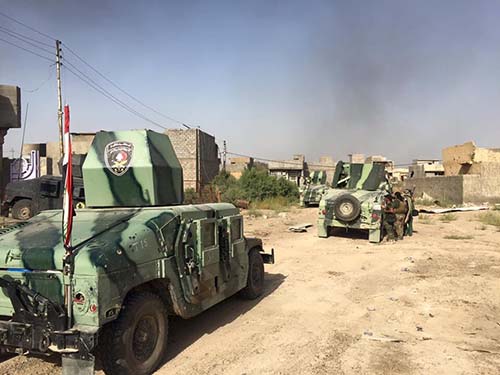The siege of the ISIS stronghold of Falluja has attracted the attention of newspapers and TV on Iraq. From hour to hour the news on the military evolutions in the whole province of Anbar are updated: in these hours the offensive of the Iraqi Armed Forces, already on the periphery of the city, slows down for the use of human shields by the militiamen of the Caliphate.
The wait for the fate of the civilians and for the final outcome of the battle lets the struggle against the Islamic State be enveloped by a single mantle of anxiety and trepidation.
Apparently in fact the war fought in Syria and Iraq is one. At least this tends to simplify the mainstream media, trying to distinguish in a Manichaean way the good from the bad. In reality the two great scenarios belong to even opposite geopolitical quadrants.
First things first.
The military difficulties of ISIS in recent months in Syria are now in the public domain. Equally well known is the large-scale offensive by Iraqi government forces to eradicate terrorism.
What is good to distinguish is who fights what.
In Syria, the real war against the Islamic State is done by the Syrian Armed Forces and their allies: mainly Russians, hezbollah, Iraqi Shiite militias and Shiite militiamen trained by Iran. An important role on the northern front is played by the Kurds in their declinations YPG e SDF. Their weight has grown significantly in recent months with US direct aid, released after years of tug-of-war.
Against the institutionalized terrorism of the Caliphate, the coalition of virtuous countries headed precisely by Washington also fought on paper, but for which there has been no concrete trace in Syria for three years. Countries such as Saudi Arabia are officially part of this coalition, and there is not much to add to its close ties with Sunni Wahhabi Islamic fundamentalism.
The military evolutions of the Syrian framework have however changed the cards to the point of pushing the United States to intervene in a visible way: the CVN Eisenhower will stop in Naples in the coming days before reaching the eastern Mediterranean and becoming operational. In this way the participation in the defeat of the feared Islamic State will be blatant and incontestable.
It is important to underline however that the West, on the enemy card of ISIS, in Syria is also an enemy of Damascus, that is of the Syrian government officially and internationally recognized. 
In Iraq, the situation is practically the opposite. The forces fighting the Caliphate are supported by the West, of which I am the direct emanation. The Iraqi Armed Forces, unlike the Syrian ones, have been established, trained and armed by the United States of which they are a sort of dependance. Just a photo to clear your mind.
Even in Iraq as in Syria, alongside regular forces, they are fighting Shiite militias, animated by atavistic hatred against Sunni (and minority) power in the country. Falluja was a Sunni stronghold at the time of the American invasion of the 2003, so much so that it resisted a year of urban guerrilla warfare and earned phosphorus and plutonium bombs in the famous 2004 massacre. Not surprisingly, rumors of summary executions of Shiite militiamen against Sunni civilians who fled the city accused of collaborating with ISIS terrorists began to multiply.
Unlike Syria, where a war of aggression against a sovereign state resold as an Arab Spring has been fueled from outside, a civil war is taking place in Iraq, a legacy of the 2003 war, which is basically never over.
The revolt against Assad began in the 2011 and the ISIS took over only in the 2014 with militia of mainly foreign origin.
Iraq, on the other hand, is the original cradle of the Caliphate that grew up in the shadow of the clash between Shiites and Sunnis, endemic in the country. Falluja, a Sunni fiefdom, is at 120 km from Kerbala and less than 200 from Najaf, Shiite shrines. The friction is very strong.
Basically today in Iraq on one side there are fugitives of the dissolved Iraqi military institutions (armed forces, party Baath and police) and militiamen of the "Sunni international" which supports the Islamic State; on the other, the new institutions supported by the USA, which are joined by the Shiites for mere power interests.
The main difference is all here: while the West (the USA) has no interest in Damascus to prevail over the Islamic State, in Iraq the victory of the Baghdad government would partially legitimize the nefarious adventure of 2003 and the elimination of Saddam. If ISIS lost in Syria, it would be half a defeat for the United States and the Westerners who followed them. If, on the other hand, ISIS were defeated in Iraq, it would be a near-victory for Washington and allies.
From here we understand the media darkness that envelops the victories of Damascus in Syria and the emphasis given instead to the Iraqi offensive on Falluja.
Iraq and Syria are the scene of two different but equally absurd wars, the result of the same failure.
(photo: القوات المسلحة العراقي)












